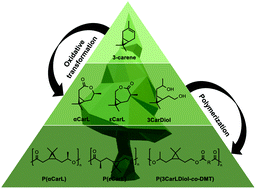Polyester synthesis based on 3-carene as renewable feedstock†
Abstract
Utilizing renewable feedstocks for the synthesis of biobased and preferrable biodegradable polyesters as substitute for fossile-based polymers remains one of the major challenges towards a sustainable polymer economy. One such feedstock is turpentine oil, a byproduct from pulp industry which is additionally not competing to crop space. While two of the three main turpentine components found in wood, α-pinene and β-pinene could already be transformed to polyesters, 3-carene as third main component remains so far unexamined. Using a multi-step oxidative transformation involving hydroboration, oxidation and Baeyer–Villiger oxidation for obtaining 3-carene based lactones, two different regioisomers, α-carenelactone (αCarL) and ε-carenelactone (εCarL), could successfully be isolated. Both monomers and a mixture thereof were successfully polymerized using different metalorganic catalysts, yielding two amorphous and one semi-crystalline polyester. Additionally, 3-carene is subject to reductive ozonolysis, providing 3-carene diol (3CarDiol) which could be copolymerized with dimethyl terephthalate to obtain a polyester as well. All polyesters were examined using thermogravimetric analysis and differential scanning calorimetry, revealing glass transition temperatures between −15 to 50 °C and a melting point of up to 170 °C, making these polymers highly promising candidates for further research.



 Please wait while we load your content...
Please wait while we load your content...